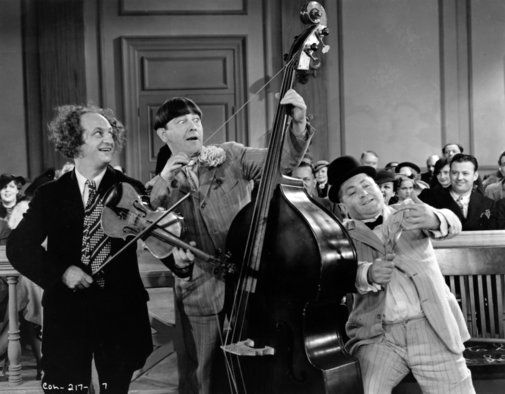It’s the meme that keeps on meming, the canard that will not die. You can read it in the musical press and find it all over your Facebook feed. Why is it that classical music is in such precarious shape in the U.S.?
It’s because of the “dumbing down” of our culture.
Classical music, you see, is smart. Other kinds, or at least most, are dumb. And the Manichean distinctions continue from there. Classical music is art. Other forms are entertainment. Classical music is real (i.e., European) culture. Other more domestic forms are false, foisted on a complacent populace by corporate taste-makers, abetted by the educational-industrial complex.
Attempts to expand the classical music audience by appealing to a broader taste (often known in such circles as “the lowest common denominator”) constitute pandering, if not downright artistic vandalism. The audience’s role, to the extent it has one other than funding the whole project, is to take whatever the artists give it and like it.
Would you like examples? Get a load of the summaries of three books skewered by musicologist Richard Taruskin in a memorable 2007 review for The New Republic. Speaking of TNR, there was a piece last year by critic Philip Kennicott in which he makes the point that “an effort to popularize classical music undermines what makes orchestras great.” Other examples would be more anecdotal and personal, such a windy tirade I endured from the friend-of-a-Facebook-friend when I politely challenged his recitation of the “dumbing down” meme last week. Fortunately, my flame shields were up and I emerged unscathed.
Well, I don’t like this whole idea, not one little bit. One’s musical tastes are one’s own business, not subject to the approval of anyone else. I’m sure some of my favorite music would strike others as positively moronic, and if told so by them, would firmly advise them where they can stick the music in question. By the way, I’m no saint on this score. In fact, I was quite the arbiter of taste in my younger years. My goodness, what an arrogant jerk I was.
Further, I would suggest that anyone who places classical music on a higher level than others is both overrating classical and underrating everything else. It’s one thing to point to Bach, Beethoven or Mahler to make the argument of classical’s superiority. (Note, by the way, how the composers cited in such formulations are almost invariably of the Austro-German persuasion).
Of course, these and other immortals also make most other classical music sound like crap, so what’s the point? Any honest assessment of classical’s overall place on the quality spectrum should also include such once popular composers as Karl Ditters von Dittersdorf, Ludwig Spohr and Joachim Raff. Ever heard any of their symphonies? Go ahead and try one, then realize that in symphonic history, these dreary works are probably in the top quartile of quality. In other words, there’s lots worse where they came from, if you can imagine. If these pieces are superior to anything, I’d sure hate to hear the inferior.
Then there’s the vast amount of classical music — probably the majority in earlier centuries — whose whole purpose was entertainment. Why, for instance, should I regard most operas and operettas as high art, when they were actually composed for the audience’s fun and the composer’s profit? Same with ballets, orchestral showpieces, most classical songs and piano works — are Adam’s “Giselle,” Rimsky-Korsakov’s “Russian Easter Festival Overture” or Grieg’s “Lyric Pieces” really more important to our culture than, say, Bruce Springsteen or Billy Joel, just because they’re classical?
And now we get to those other types of music. You know, the commercial entertainment music, of the kind made by such insignificant panderers as Stephen Foster, Scott Joplin, Louis Armstrong, Duke Ellington, George Gershwin, Richard Rodgers, Benny Goodman, the Carter Family, Robert Johnson, Ella Fitzgerald, Hank Williams, Charlie Parker, Sonny Rollins, Stephen Sondheim, Paul Simon, Bob Dylan, Ray Charles, Johnny Cash, Jimi Hendrix, Laura Nyro, Frank Zappa…I could go on and on, right up to such current names as Sufjan Stevens, Adam Guettel and Maria Schneider (whose “Winter Morning Walks” with Dawn Upshaw and The Knights last week at Tanglewood was my live musical highlight of the year).
Yes, I’m doing the same thing as above here, naming the immortals as if they represented the whole. But I would take these names, add dozens more, and say that these musicians have made a more important contribution to American art and culture than any amount of European classical music. Note that I didn’t say they’re greater than classical music. But neither will I say or do I believe that they’re any less vital, creative, culturally resonant or smart than classical. They speak of and to the American experience, and do so with fervor and brilliance. Genius, even.
Finally, this suggestion: Can we just get rid of smart/dumb, art/entertainment and real/fake culture when discussing music? They’re false, unhelpful and, if you’ll permit, un-American. We’re too open and democratic for such elitist distinctions. And at a time of increased musical genre-bending and pluralism, the distinctions are increasingly indistinct. If we need to make distinctions, how about we stick with good/bad? Heaven knows, there’s plenty of both in all genres, and it’s still important to distinguish them. Better yet, let’s stick with I like it/I don’t like it, and leave it at that.
P.S. Would you like a current example of genre-bending genius in American popular music? Check out this track from singer-songwriter Gabriel Kahane’s brilliant album “The Ambassador.” It’s Kahane’s account and reflection on the tragic shooting of a teenager named Latasha Harlins at a Los Angeles liquor store in 1991, and is as masterful and skilled as it is painfully poignant


One thought on “Who you calling dumb?”